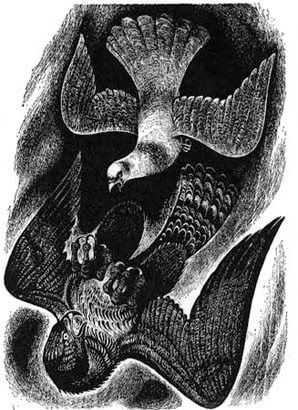
Fritz Eichenberg, "Pax Vobiscum" (1969) [Woodblock Etching]
"What would we advocate? Wholesale disloyalty to Americanism. Wholesale refusal to fight. Wholesale withdrawal of labor (a general strike) from all industries that further the war effort. We would urge a mighty band of Catholic Conscientious Objectors who will refuse induction, who will follow Jesus of Nazareth, Prince of Peace, in the way of non-violence, in love for all mankind!"
-Dorothy Day, from "We Are Un-American; We Are Catholic", The Catholic Worker (1948)
5 comments:
What a powerful image and inspiring sentiment. I love the daring and utter indifference to small-minded notions of patriotism. Was this a fluke, a statement in a fringe leftist Catholic journal, or indicative of widespread pacifism, you think?
Is there a chance that Germany's staunch Catholic roots might've played a role here in inspiring dissent from American foreign policy?
Incidentally, I applaud your subversive streak, posting this on the 4th. In a similar vein, my definition of patriotism is "My country, right or wrong." Except that I know the rest of the quote (by Karl Schurz, who happened to be a prominent German-American at the turn of the century): "When right to keep her right./When wrong, to put her right." These sentiments seem too nuanced and independent for many so-called American patriots today.
i think in fact her catholic radicalism was nurtured by her involvement with marxism and the iww, though her own bent was more anarchist. day was also very consistently pacifist until her death in 1980, and while that position was more acceptable at other periods, she actually lost a lot of catholic support during ww2.
so in the 1940s the worker movement was marginal and it has returned to a marginal position today in many ways (though there were several worker types at notre dame while i was there including one of my committee members - nonetheless it was considered an eccentric, if acceptable, position to hold within catholic theology). it's height was really during the 60s into 80s., with the coming of dorothy day's death.
there are still catholic worker houses and farms throughout the united states though and i think the movement remains important because of how resistant it remains to allowing catholicism to be sublimated into the program of political liberalism. this is in fact where the worker movement is at its most influential, especially among the younger generation of catholic ethicists and political theorists. (the older generation being fairly solidly liberal: the younger generation seems to be splitting between radical and conservative, to use very oversimplified descriptions).
Interesting.
You might be interested in this, if you haven't already seen it:
Lew Daly
"In Search of the Common Good: The Catholic roots of American liberalism"
http://bostonreview.net/BR32.3/daly.html
thanks for the link.
you might be interested in dorothy day's autobiography, the long loneliness, which takes us through her early life.
i have to admit to being much more partial to another american catholic writer of the period: flannery o'connor.
Post a Comment